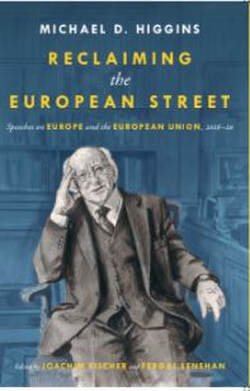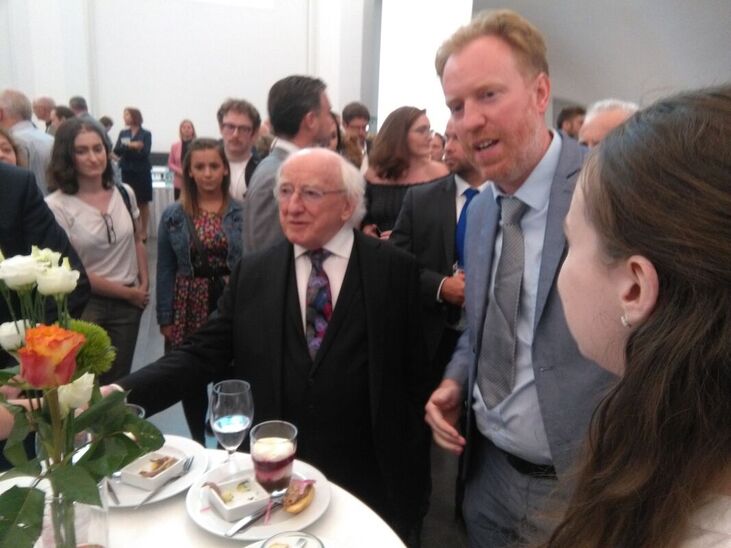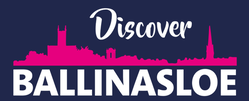|
by Fergal Lenehan Beagh / Birchgrove native - Fergal Lenehan is based at the University of Jena, Germany, where he is a full-time researcher at the project ‘ReDICo: Researching Digital Interculturality Co-operatively’, which is financed by the German Federal Ministry for Education and Research. .At the start of April 2021 President Michael D. Higgins’ book, Reclaiming the European Street: Speeches on Europe and the EU, 2016-2020, was published by Lilliput Press in Dublin. How did a German-based Ballinasloe native (that’s me), who has never been to Áras an Uachtaráin, has never been actively involved in the Labour Party and has never actually managed to be in Ireland to vote during a presidential election, end up undertaking this task for the ninth Uachtarán na hÉireann? There were, however, more than one name inscribed upon the cover. It also retained my name and that of my Limerick-based colleague as editors. So, what exactly does an academic editor do in an instance such as this? And, perhaps more to the point, how did a German-based Ballinasloe native (that’s me), who has never been to Áras an Uachtaráin, has never been actively involved in the Labour Party and has never actually managed to be in Ireland to vote during a presidential election, end up undertaking this task for the ninth Uachtarán na hÉireann? I teach at the University of Jena and in 2019 President Higgins visited nearby Leipzig in an official capacity, where he gave an extended speech on the future of Europe. I was teaching a seminar on visions of Europe at the time, had included some essays by Michael D. Higgins in the course material, and it made sense for me, and my class, to go and see the man himself in action. Thus, on a sweltering hot July morning we crowded into a lecture theatre in Leipzig. Through contacts at the Irish Embassy in Berlin, I also organised for my class and I to meet the President for a few minutes afterwards. I told him we had studied some of his work and had come from Jena.  My colleague who also attended said I should send him my book Intellectuals and Europe (based on my PhD thesis), as the President would be interested in reading it. I slipped it into the post when back at work, and then forgot about it. Sometime in September I received an E-Mail from one of the Irish president’s press people: He wanted to talk to me on the phone to discuss my book and was wondering if I was available that afternoon. Unfortunately I had missed the E-Mail. I was at home minding my daughter and hadn’t been checking my work mails. “That afternoon” was the day before. I e-mailed back and said that I was available now. Thus, President Higgins chatted to me, sitting in our German rental apartment, on the phone from Áras an Uachtaráin, while my daughter watched Paw Patrol on TV. His first question was to enquire how my daughter was feeling. We then talked about my book, Sociology and the research of the President’s son. He then, at some stage, asked if I would be interested in working with him on a volume of his European speeches as editor. I said I would and would ask my colleague Joachim Fischer from the University of Limerick to be co-editor. An academic editorship is always better in pairs. So what does an academic editor do? Like literary and journalistic editors, they often make long stories short. They read texts critically and suggest changes. Unlike literary editors their names often appear on the books. Added to the language-bettering, text-shortening and book-structuring tasks, academic editors manage authors (there are, generally, more than one), decide what articles or chapters to use or not to use, come up with a book’s name and, most importantly, often write an introduction, which situates the volume within a wider research and intellectual context. So academic editors are usually authors too, of a kind. But Reclaiming the European Street is not just for academics; it’s for any discernible reader who wishes to engage with ideas about how society could be run differently, beyond present structures, with the reality of climate change and economic precariousness impinging increasingly upon our daily existence. As an Irish person living abroad I can’t vote to elect the Head of State, as Ireland is one of the few remaining states not to allow any of their immigrants a vote. Usually “not contributing to society” is suggested as a reason for not consenting to this. I can’t vote for the Irish president, but I can edit and contextualise his book. Maybe, just maybe, this is also a small contribution to the future of Irish society.
0 Comments
Leave a Reply. |
CLICK HERE to read the Latest Ballinasloe News Articles
June 2024
|
The Town Team was set up by BACD Ltd. to revive the fortunes of Ballinasloe and its hinterland. With the main focus to build on the town’s many strengths, change existing negative perceptions and bring about measurable improvements in the town centre economy and its wider social value.
|
Ballinasloe Area Community Development Ltd.
Ballinasloe Enterprise Centre Creagh Ballinasloe Co. Galway |
All generic photos and images have been sourced and are free of copyright or are clip art images free of copyright. Photos of Ballinasloe have been donated by BEC. If you have any photos that you would like included on the website please email us
Copyright © All rights reserved, 2024 BACD


 RSS Feed
RSS Feed
